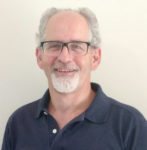 Michael Murray
Michael Murray
Michael recently joined the TESL Kingston Board, and agreed to a short interview:
1. What motivates you to work with newcomers and ESL learners?
My goal in the classroom is to provide a learner-focused environment for language acquisition as well as an atmosphere that helps my students realize their intrinsic value as people. Motivating them to learn, grow and succeed is a large part of what motivates me.
2. What are the current needs of these communities, locally?
We are engaged with immigrant people who are facing a time of great opportunity and ongoing challenges. There is a significant effort by many people in local communities to reach out and help these people as they adapt to their new home. The government is initiating programs to provide long-term employment and even small business (farm) ownership for many Syrian refugees in particular. Language acquisition and our part in it will continue to play a key role in their success not only in terms of economic viability but also for their social integration. Non-refugee immigrants also need help in accessing services like health care and in preparing themselves for the current job market. We as teachers can refer them to government services and local organizations set up to “help them help themselves”.
3. What are some of the main achievements in your work in the field of ESL?
I began teaching English to speakers of other languages in the 80s in an intensive language program at my grad school and then at my alma mater training foreign grad students in research presentation. My wife and I then moved to China where I taught English for academic purposes to grad students in a science university. We then moved on to a “minority nationality” area where I taught undergrads from many different ethnic and socio-linguistic backgrounds. My favorite course there was American literature. From time to time some of my students have contacted me to say how much those classes meant to them because I tried to make the literature and the history it reflected and addressed come alive for them. When we studied Jack London, for example, I took them up the mountain behind our school on a freezing morning in winter and then gave them hot chocolate on top. I challenged them to decide for themselves whether life was like London’s portrayals or like other authors who saw hope beyond the difficulties. Some of my students became teachers. Others found jobs in the tourist and airlines industries. Some studied overseas and eventually immigrated to the west and make a lot more money than I do. (Are smiley faces allowed at the end of paragraphs yet?)
4. TESL Kingston is looking for new members. What would be your recommendations to them? Why do you think local educators, mentors, tutors and volunteers in the field should be joining TESL Kingston?
I joined TESL Kingston so that I could get to know others in the field of ESL and become better equipped myself to provide the best for my students. I have learned so much from my colleagues over the years and that continues to be the case via the practical activities and professional networking which TESL Kingston provides. I encourage all those involved with ESL to consider joining us as we seek to better ourselves for the benefit of those we serve.
Community Profile – Jade Garrison
Community Profile – Shar Taw Moo
Community Profile Liying Cheng